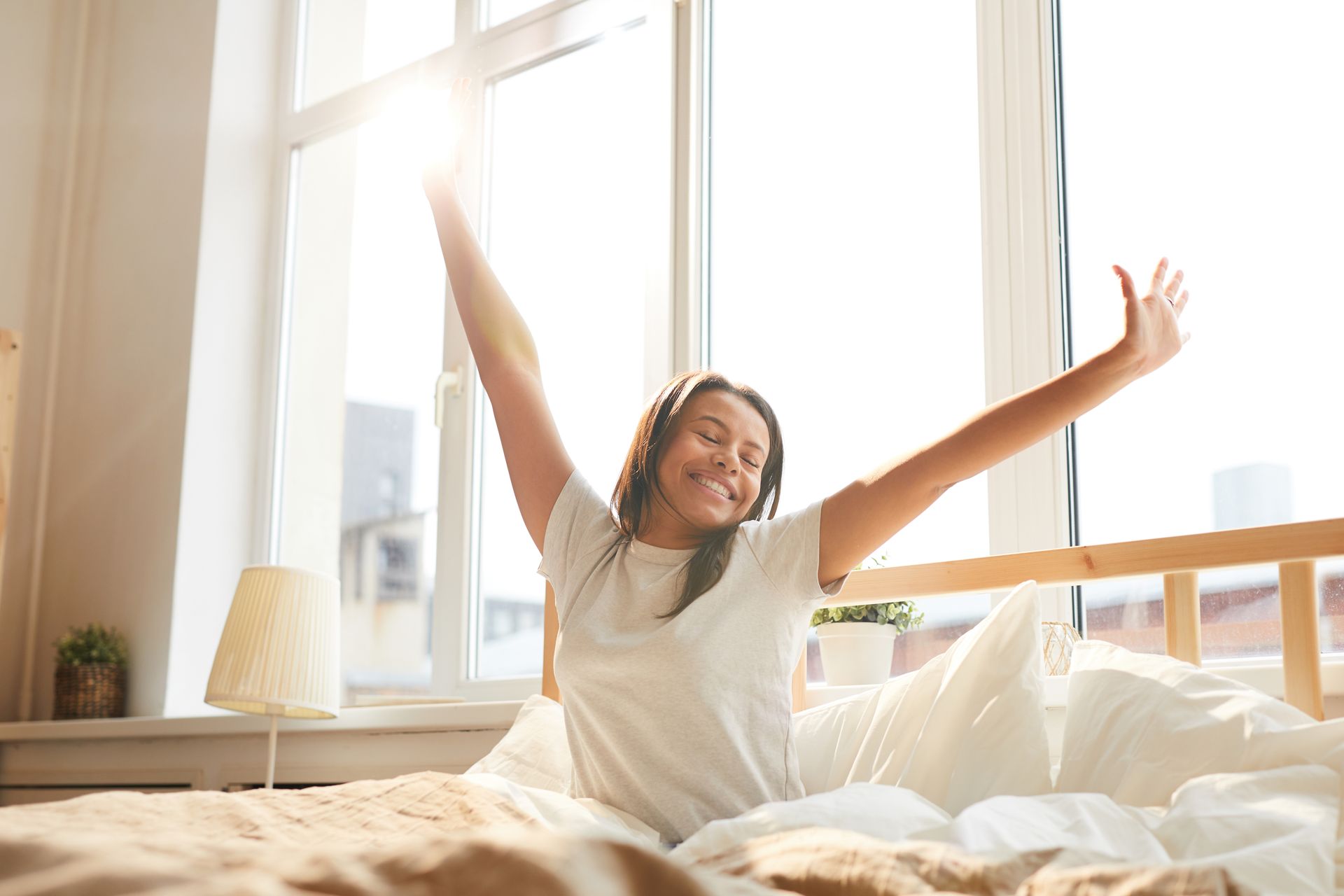Portrait of Mixed-Race woman stretching sitting in bed lit by sunlight, copy spaceContinue reading Mixed Race Woman Enjoying Morning
Have you ever experienced this vicious cycle? It goes like this:
You’re stressed out, so you have trouble sleeping, but then because you’re not getting enough sleep, you feel more stressed.
The struggle is real!
One of the many things happening in our bodies when we’re stressed is that the hormone cortisol is released and surges through our system.
When we don’t get enough sleep, our cortisol levels are raised, which makes us feel even more stressed and anxious.
The final added challenge comes when we make it back to bedtime. Many of us go from running around nonstop right into bed without doing much to decrease these cortisol levels.
As a matter of fact, we may even do activities, like binging on a few dramatic Netflix episodes (Ozark, anyone?!), that raise our stress hormones even more.
So, what’s the big deal? Apart from feeling tired, why does all of this matter for our wellness, and what can we do to break the cycle?
The long story short is that sleep impacts everything.
We’ll focus on just four areas today, keeping in mind that for many of us, our work and our health are two areas where a lot of our stress can stem from.
1. Emotions
In studies focusing on sleep-deprived participants, researchers saw a 60% amplification in emotional reactivity in the amygdala, which is a part of your brain linked to the fight or flight response. So, in addition to feeling more stressed, we’re also more likely to be on a rollercoaster ride of feeling overly excited one moment and overly frustrated the next.
2. Immunity
Studies also show that the less we sleep, the more compromised our immune system is. In one example, a group of participants slept five hours a night while another slept seven hours or more. The following week, they were all exposed to the common cold virus, and those sleeping only 5 hours on average had an infection rate of 50%, whereas the longer sleepers had only 18%.
3. Weight
Your two hunger hormones, leptin and ghrelin, become disrupted when you sleep less than 5-6 hours/night. Leptin signals that you’re satisfied, and ghrelin lets you know that you’re hungry. When we don’t sleep enough, leptin decreases, and ghrelin increases, causing us to eat up to 300 calories more each day. This equates to 10-15lbs/year, as we also crave sweets, salty snacks, and heavy carbs up to 30-40% more when in this state.
4. Work Performance:
The less we sleep, the more our work performance can be impacted. Studies show that under-slept employees take on less challenging problems, produce fewer creative solutions, and exert less effort when working in groups (no one likes to be that colleague!).
What We Can Do About It
Most of us live in a society that glorifies minimal hours of sleep and maximum hours of productivity. It can be hard to go against this grain, but this research shows that one of the best things you can do for your physical, mental, and emotional health is reprioritizing your relationship with sleep.
And why not?! It’s a free tool that can support all of the other work to stress less and feel like your healthiest self.
6 Tips To Help You Get More Sleep:
- Set an alarm… to go to bed! Most of us are more than familiar with our alarm clocks in the morning, but what about in the evening? If you get sucked into TV or your phone, this gentle reminder can help you get back to a bedtime that’s better for your health.
- Wear blue light blocking glasses. Since stepping away from technology altogether isn’t realistic (or of interest!) for most, trying to minimize the blue light you’re exposed to is your next best bet. This light interferes with our melatonin production, delaying that sleepy feeling, so wearing these shades or using a blue light filter can be a good workaround if you’re on your devices. Working towards cutting off all technology one hour before bed is a great goal as well!
- Create a sleep ritual. You may be wondering what’s left to do if you’re not using technology, and there are many options! Think of what practices and activities are calming to you – some popular ones include gentle stretching or restorative yoga, meditation, and reading an actual book.
- Empty your brain. If you notice you’re “tired but wired” and seem to have a million thoughts pop into your brain when your head hits the pillow, try journaling before bed to quiet the chaos. Leave a notebook by your bed to write down that random to-do item that may come to mind, too!
- Say no to Joe. A cup of coffee has a half-life of 6 hours, which means that when you enjoy your 3pm mug, half of its potency is still pulsing through your bloodstream at 9pm. Consider other energy-boosting activities in the afternoon, or try scaling back a little bit at a time.
- Keep it cool. Your body temperature needs to drop 2-3 degrees to activate sleep. If you’re aiming to up your sleep quality, try keeping the thermostat low and/or taking a bath before bed.
All statistics and studies are sourced from the book Why We Sleep by Dr. Matthew Walker.

